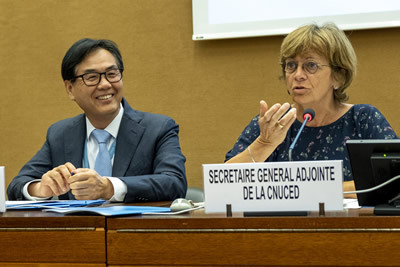
Water Conservation: 7 Simple Ways to Save Water at Home and in Your Business
Water is one of our most precious resources, yet it is often wasted without thought. ...

Small and medium-sized enterprises (SMEs) account for 90% of all newly created businesses in developing countries, the investment and enterprise director of the United Nations Conference on Trade and Development (UNCTAD) said.
SMEs have the potential to contribute powerfully to multiple Sustainable Development Goals (SDGs) targets across sectors, given their diverse operations, said James Zhan during a two-day UNCTAD meeting on investment and entrepreneurship which wrapped up on Wednesday in Geneva.
“This makes the SDG and SME development agenda complementary and mutually reinforcing,” Zhan said.
Entrepreneurship had a catalyzing effect for job creation, income generation and igniting economic activities in poor areas, he added.
“SMEs provide about two-thirds of all formal jobs globally,” Zhan said. They also provide disadvantaged groups such as migrants, young people and women with opportunities.
He said UNCTAD’s work to build the capacity of these disadvantaged groups through its Empretech program had been spotlighted by the UN General Assembly as a model that could be replicated.
While the unemployment situation is dire, entrepreneurship offers hope.
Zhan said some 60 million young people were unemployed globally while 40 million more entered the workforce every year, according to various sources.
For example, he said, through entrepreneurship more women could participate in economic activities, as currently only 49% of working-age women do so, compared with 75% of men.
He added that more women needed to be supported to own businesses, as women are currently five times less likely than men to own businesses, making them more vulnerable and hurting the greater economy.
The world needs more businesses that do good while also doing well to achieve Sustainable Development Goals (SDGs) by 2030, experts at an UNCTAD meeting on investment and entrepreneurship said.
UNCTAD Deputy Secretary-General Isabelle Durant opened the meeting with a call for the scaling up of such businesses to chip away at poverty and drive inclusive growth.
Her message falls squarely in line with the 2030 Agenda for Sustainable Development, the United Nations’ roadmap for peace and prosperity for people and the planet.
Inclusive businesses benefit low-income communities. “These businesses build bridges between companies and communities, create new markets, jobs and expand opportunities for all,” Durant said.
She said a UN General Assembly resolution adopted last year reconfirmed for the fourth time the critical role of entrepreneurs and businesses in the quest towards sustainable and inclusive development.
“Entrepreneurs face many challenges. They require the support of governments to grow and contribute to development,” Durant said.
She also drew attention to UNCTAD’s entrepreneurship policy framework, first designed in 2012, which could be adapted and expanded by governments to create more economic opportunities, especially through small and medium-sized enterprises (SMEs).
“This means we have to look beyond conventional modes of employment to accommodate this vast number of young job seekers in economic activities.”
An inclusive business is a triple win as it creates positive public, social and economic impacts, said Markus Dietrich, director of the Inclusive Business Action Network.
He said the inclusive business space is an unprecedented opportunity with 4.5 billion people in developing countries representing a market of dlrs 5 trillion.
“Impact investing provides an avenue to use private sector contributions to achieve the SDGs,” Dietrich said.
However, the potential of impact investing remains untapped because some investors have difficulty finding the right companies to invest in.
“We have trillions available but they (investors) don’t find the right investment opportunities,” Dietrich said. “Impact investors are not only looking for financial returns, but also social impact.”

اترك تعليقا